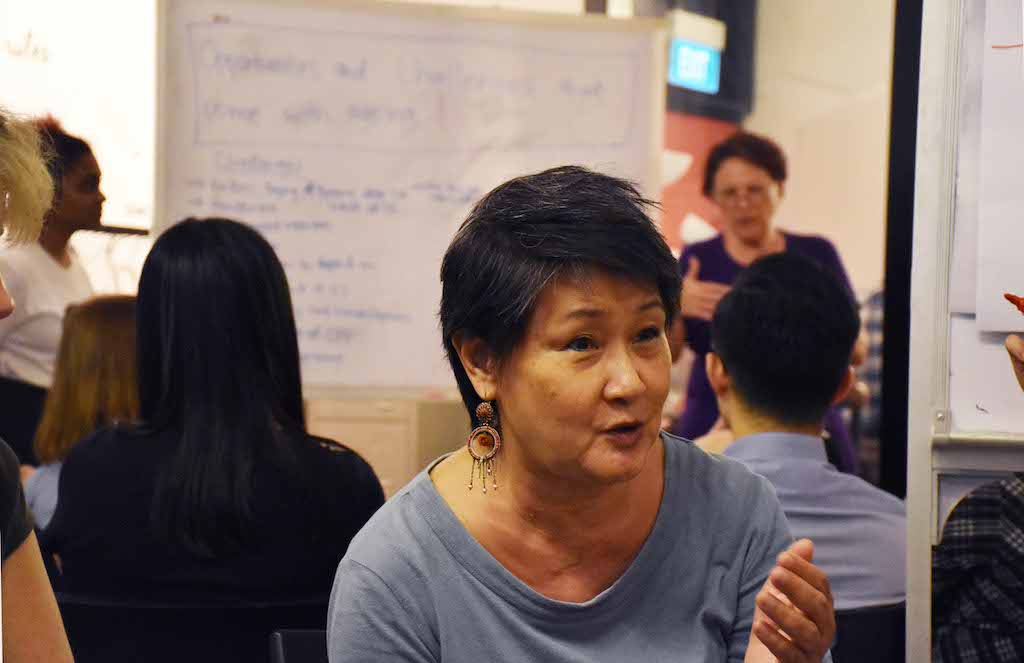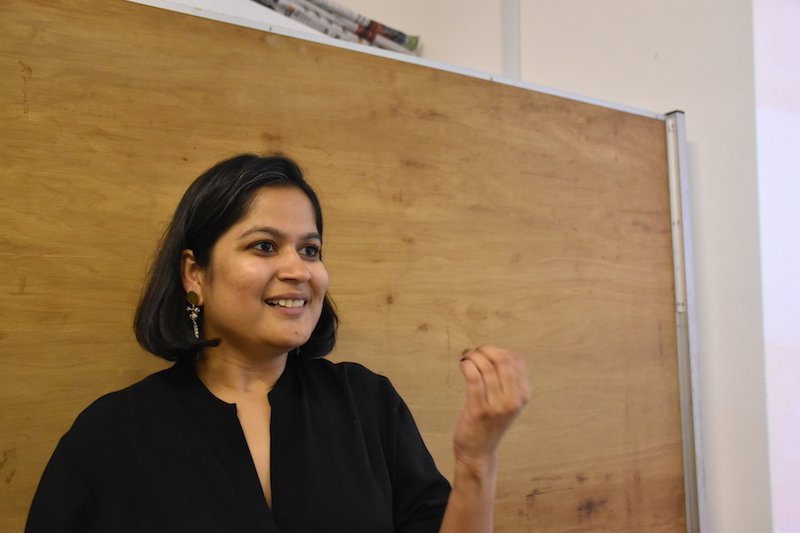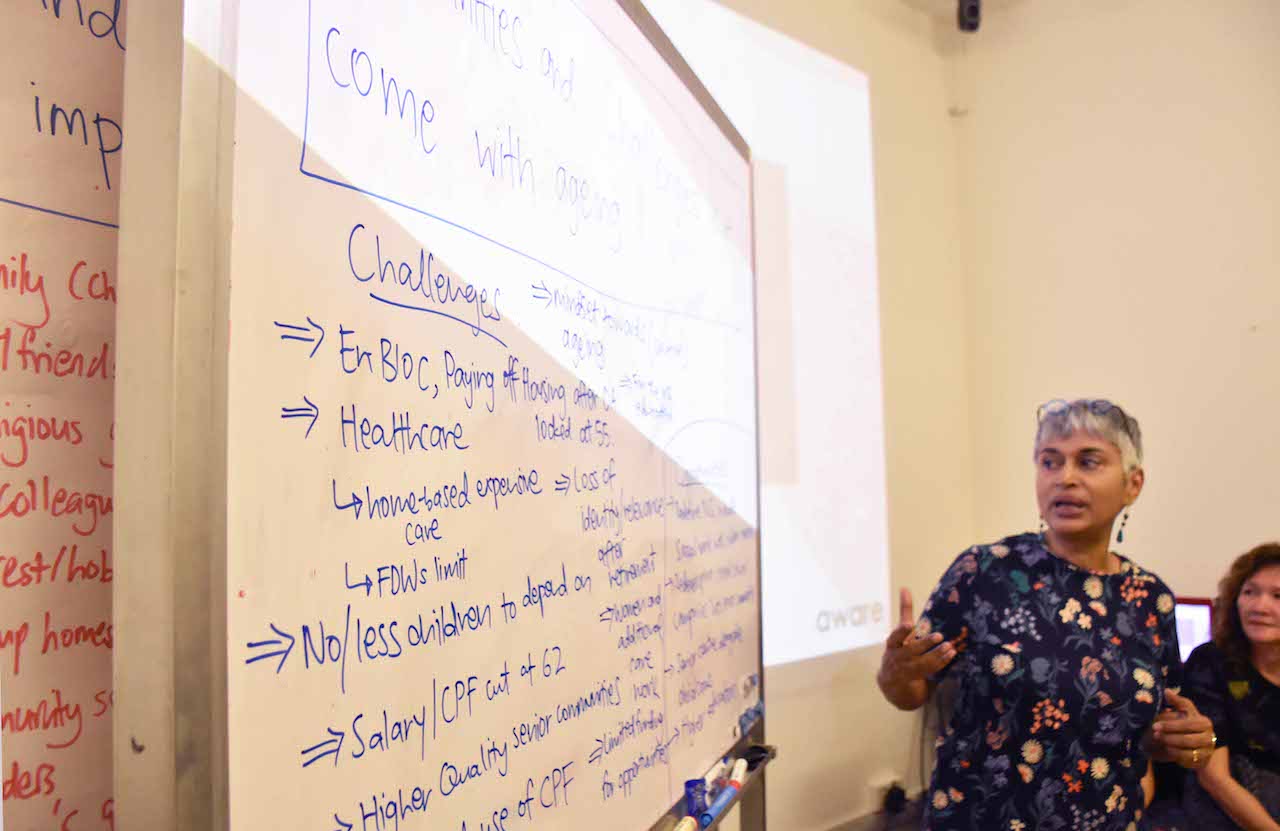-
Advocacy Theme
-
Tags
- Abortion
- Adoption
- Caregiving
- CEDAW
- Disability
- Domestic Violence
- Domestic Workers
- Harassment
- Healthcare
- Housing
- International/Regional Work
- Maintenance
- Media
- Migrant Spouses
- Migrant Workers
- Muslim Law
- National budget
- Parental Leave
- Parenthood
- Polygamy
- Population
- Race and religion
- Sexual Violence
- Sexuality Education
- Single Parents
- Social Support
- Sterilisation
- Women's Charter
A Recap: Engaging Ageing—an open conversation for women
July 8th, 2019 | News, Older People and Caregiving

Written by Meryl Yu, AWARE intern. Photographs by Megan Tan.
Ageing. Some of us dread it, some of us make peace with it, but how do we talk about it?
On the evening of 27 June 2019, AWARE hosted “Engaging Ageing”, an open conversation for women to come together and connect over their worries, struggles and hopes about growing old. Emotions oscillated between joy, exasperation and sorrow, as the 40 women present engaged in topics spanning changing social networks, injustices at the workplace and loneliness.
Shailey Hingorani, AWARE’s Head of Research and Advocacy, kicked off the event on a high note with the opening question: “What is one thing you look forward to about growing old?” While one participant conceded that “your body betrays you”, she “look[s] forward to every day where I can be myself”. Her words were heartening and soon murmurs of agreement filled the room. Travelling more, better government welfare and hopes for a second career were amongst some of the joys shared for the future.

Constance Singam, past president of AWARE and one of the guest speakers, turned the conversation towards the loss of community as one ages: “We need a community, to be useful, to be relevant… we need the autonomy to tell our own story, our own narrative.”
She emphasised that community is not always bounded to a geographical location, but rather encompasses the sense of belonging and interdependence that comes from being part of something bigger than oneself. Her main message for the audience was for them to build like-minded communities that can be pillars of support, familiarity and stability.
The next guest speaker was Margaret Thomas, founding member and current president of AWARE. Speaking about the hurdles older workers face staying relevant in the workplace, and how these hurdles conflict with one’s sense of identity, she suggested that “journalism is one area where the people with experience can continue to contribute”. Older workers have a wealth of knowledge and wisdom that is not only underutilised, but also undervalued by wage cuts – which do not always come a commensurate reduction in working hours. Old-age contracts can penalise older workers simply for growing old, and this message of depreciation affects their sense of self-worth.
With the audience warmed up over food, they were then free to choose one of three topics to discuss further in smaller groups. Here is a brief rundown on what was shared:
1. New Financial and Social Obstacles
Participants grappled with the financial realities of ageing, such as constraints on one’s Central Provident Fund (CPF) account, expensive home-based care, and pay cuts for older workers. Social realities such as disengagement from one’s community, loss of relevance after retirement and loss of autonomy were brought up as well. Nevertheless, on the brighter side, participants hoped to have more time and energy to pursue higher education and overseas travel.
2. Loneliness and Changes in Social Networks
How does the physical state of ageing contribute to loneliness? With lower energy levels, finding the motivation to go out is a challenge. Nor is it only a question of energy. One participant made clear that loneliness is not solved by simply finding new ways to keep busy: “Even if your life is filled with activities, it doesn’t mean you’re not lonely.”
Despite the complexities of loneliness, many came forward with solutions that worked for them. Harnessing social media in a way that connects, not disconnects, us is vital. One participant shared that simply utilising the audio message function on her WhatsApp, or choosing to have a Skype call instead of a series of check-in messages, could go a long way in “humanising” her interactions.
3. Support Networks for Ageing
Women-centric spaces, family, religion and interest groups were cited as important sources of support. However, some were disgruntled with the state mandate of “family first” as the predominant way to help seniors age happily. While family members might be able to take care of older persons’ emotional needs, they most likely lack medical training. And many family members aren’t in positions to look after their older relatives financially. The expectation for older persons to exhaust all forms of family support before requesting state support, some participants concluded, is unfair.

All of us, female or male, will age. However, older women suffer from worse health, are at a higher risk of isolation, and have lower financial security, compounded by the years outside of the workforce spent caregiving. A 60-year-old woman, on average, will spend an estimated eight of her remaining years in disability, while a man of the same age will spend only three years in disability. Moreover, women’s longer lifespans mean they have a higher likelihood of experiencing bereavement, increasing their risk of social isolation. Having spent years outside the workforce caregiving, women have lower financial security at a later age.
Of course, the concerns of growing old often seem irrelevant to younger individuals. When should the young start caring about ageing? Megan Tan, an AWARE intern, spoke about how the dialogue session changed her perspective on ageing: “Hearing what the elders said about ageing helped me empathise with my grandpa a little bit more. It also taught me the importance of community, which is what I will aim to have when I get older.”
So how do we engage ageing constructively and meaningful? The first step is to talk about it, and we hope that the conversations that emerged that evening will extend beyond our single session.



